The Summer Course organized by the Faculty of Agricultural Technology UGM has entered its 2nd day on Tuesday, August 9, 2022. The series of events on the second day started at 06.45, which started with the opening by the presenter. Then continued with the first session, namely the presentation of material by Asst. Prof Xiongzhe Han, Ph.D. After the first session ended, it was followed by a Virtual Field Trip and group discussion. The second session started at 09.45 and was hosted by Andri Prima Nugroho, S.T.P., M.Sc., Ph.D. After the break session, the presentation of the material was continued by Prof. Takashi Okayasu, Ph.D at 13.00 as the third session. Today’s activity ended with the presentation of material from Asst. Prof. Ravipim Chaveesuk at 3pm.
The first session was hosted by Asst. Prof. Xiongzhe Han, Ph.D. which is entitled Agricultural Robotics, Remote Sensing and Sensor Development in The Agro-Industry Sector. This session was accompanied by Mrs. Aryanis Mutia Zahra, S.T.P., M.Si as a moderator. Prof. Han explained about Digital Agriculture (DA) and his research such as Auto-Guided Agricultural Field Machinery and UAV-based Precision Agriculture and High Throughput Field Phenotyping. Unmanned farming systems based on digital agriculture can work with autonomous driving farming machines operated in groups using advanced technologies such as 5G, GNSS, AI, and Drones.
Before switching to the next sessions, participants were welcome to see a virtual field trip with the theme of implementing smart farming on local farmers. This virtual field trip shows how Mr. Mino as a representative of local farmers is slowly starting to switch to using technology. The technology that Mr. Mino uses in his garden is called the Field Monitoring System. The Field Monitoring System (FMS) itself is capable of monitoring the real-time state of the land with various sensors such as temperature sensors, humidity, sun intensity, and rain. Data from the sensor will then be forwarded and stored in the cloud and can be accessed via a smartphone. This tool is expected to help farmers and make many young people interested in becoming millennial farmers. After seeing the footage of the field trip, the participants were then divided into several breakout rooms according to their respective groups. In the breakout room, the participants discussed the pros and cons of smart farming, then each group of participants would make a presentation on the results of the discussion.
The second lecture was given by Andri Prima Nugroho, S.T.P., M.Sc., Ph.D entitled The Role of Smart Agriculture to Support Food Security. This session was accompanied by Dr. (cand) Deffa Rahadiyan, S,Si. as a moderator. There are 3 stages of the adaptation of precision agriculture in tropical environments. They are human based, technology based, and the important thing is knowledge based. If we want to go to smart farming we should realize that there is gap analysis from the existing condition to the ideal condition. So we should combine several knowledge (smart agriculture framework) into 4 research groups to know what the best thing to do to remove the gap. The 4 research groups are called smart agriculture frameworks. The first group is environmental monitoring and assessment. The second is Plant monitoring & assessment. Thirdly is autonomous and agricultural machinery. And the last is knowledge & information management.
The third lecture was given by Prof. Takashi Okayasu, Ph.D who explained the material on Visualization of Plant Phenotype Using Computer Vision. This session was moderated by Muhammad Khoiru Zaki, S.P., M.P., Ph.D. Prof. Takashi in this session explained that agricultural products must be connected from the production side to the consumer side. We must be able to create a sustainable cycle between farmers and consumers in order to maintain the supply chain of agricultural products. However, if we want to maintain the supply chain of agricultural products, we must know the cost of planting. So we have to get information from plants. Prof. Takashi Okayasu developed computer vision to obtain information from plants. This computer vision is developed with various sensors such as sensors for humidity and TST. These sensors will then help maximize the photosynthetic process that occurs during the growth of the plant phenotype. The data information obtained from the sensor can be used to monitor environmental conditions in the planting area so that it can help make decisions about the treatment to be carried out on plants. Takashi Okayasu uses Arduino programming to activate the agricultural sensors.
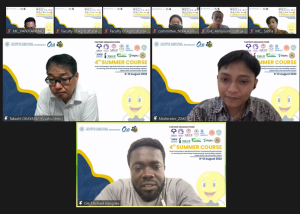 The fourth session which was also the last session was presented by Asst. Prof. Ravipim Chaveesuk. Mrs. Ravipim presentation entitled “The Implementation of Computational Intelligence (Neural Network and Fuzzy Logic) in the Agricultural System”. This session was accompanied by Mr. Imam Bagus N, S.Si. M.Sc. as a moderator. Mrs. Ravipim explained data analytics is the process of analyzing raw data to extract actionable information and insights. There are three components of data analysis such as business knowledge; mathematics, statistics, data visualization, machine learning, deep learning; and programming. In addition, data analytics has stages depending on the level of difficulty and value. They are Descriptive, Diagnostic, Predictive and Prescriptive Data Analytics. Descriptive data analysis is considered past data to answer what happened which generally considers one variable. Data diagnostics is to consider past data and analyze it. Predictive data analytics uses past data to predict what will happen tomorrow or in other words what to expect. And finally, prescriptive data analytics is making decisions. Some big data are known as 3V such as volume, speed, and variation. Data analysis is typically used by these top sectors such as marketing, sales, social media, credit and insurance, and manufacturing.
The fourth session which was also the last session was presented by Asst. Prof. Ravipim Chaveesuk. Mrs. Ravipim presentation entitled “The Implementation of Computational Intelligence (Neural Network and Fuzzy Logic) in the Agricultural System”. This session was accompanied by Mr. Imam Bagus N, S.Si. M.Sc. as a moderator. Mrs. Ravipim explained data analytics is the process of analyzing raw data to extract actionable information and insights. There are three components of data analysis such as business knowledge; mathematics, statistics, data visualization, machine learning, deep learning; and programming. In addition, data analytics has stages depending on the level of difficulty and value. They are Descriptive, Diagnostic, Predictive and Prescriptive Data Analytics. Descriptive data analysis is considered past data to answer what happened which generally considers one variable. Data diagnostics is to consider past data and analyze it. Predictive data analytics uses past data to predict what will happen tomorrow or in other words what to expect. And finally, prescriptive data analytics is making decisions. Some big data are known as 3V such as volume, speed, and variation. Data analysis is typically used by these top sectors such as marketing, sales, social media, credit and insurance, and manufacturing.

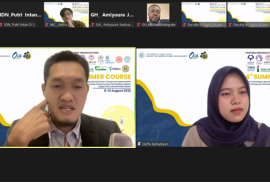
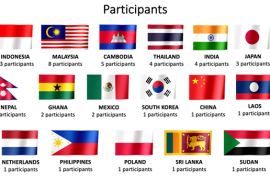
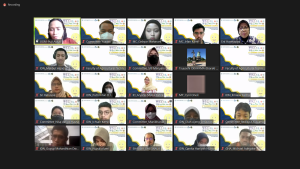
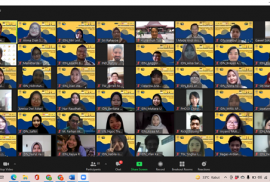
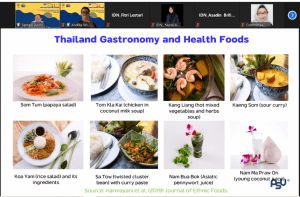 The last day of the 3rd Summer Course of Local Indigenous Functional Food’s Roles in the Era of Covid-19 Pandemic: From Farm to Table was held on July 23rd, 2021. The first session was delivered by Assoc. Prof. Dr. Santad Wichienchot, Ph.D. from Prince of Songkla University about “Influence of Functional Foods on Gut Microbiota”. Prof. Santad explained about functional foods and functional ingredients, gut microbiota, probiotics and prebiotics, and gastronomy.
The last day of the 3rd Summer Course of Local Indigenous Functional Food’s Roles in the Era of Covid-19 Pandemic: From Farm to Table was held on July 23rd, 2021. The first session was delivered by Assoc. Prof. Dr. Santad Wichienchot, Ph.D. from Prince of Songkla University about “Influence of Functional Foods on Gut Microbiota”. Prof. Santad explained about functional foods and functional ingredients, gut microbiota, probiotics and prebiotics, and gastronomy.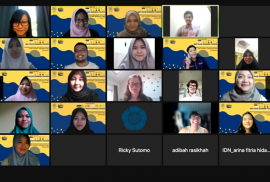
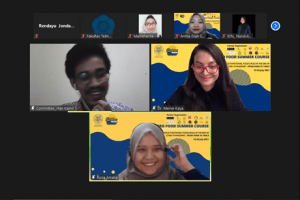 The first session was about “Functional Foods Marketing and Management” which was delivered by Dr. Merve Kaya. The main topic Dr. Merve Kaya discusses is Microalgae. Currently, microalgae are used in agriculture, aquaculture, human nutrition, animal nutrition, and cosmetics. In the future, microalgae might be used for pharmaceuticals, biomaterials, and biofuels. In addition, Microalgae have benefits in many fields such as a plant-based source with eco-friendly extraction, organic base macronutrients, and complete amino acid, and metabolic profiles with free L-amino acids. Other than that the benefits of microalgae were improving crop vigor, creating healthier plants, advancing flowering and seed/fruit development, and increasing the tolerance to abiotic stress. Hence, it is possible to create new agricultural solutions and a sustainable farming environment using microalgae products.
The first session was about “Functional Foods Marketing and Management” which was delivered by Dr. Merve Kaya. The main topic Dr. Merve Kaya discusses is Microalgae. Currently, microalgae are used in agriculture, aquaculture, human nutrition, animal nutrition, and cosmetics. In the future, microalgae might be used for pharmaceuticals, biomaterials, and biofuels. In addition, Microalgae have benefits in many fields such as a plant-based source with eco-friendly extraction, organic base macronutrients, and complete amino acid, and metabolic profiles with free L-amino acids. Other than that the benefits of microalgae were improving crop vigor, creating healthier plants, advancing flowering and seed/fruit development, and increasing the tolerance to abiotic stress. Hence, it is possible to create new agricultural solutions and a sustainable farming environment using microalgae products.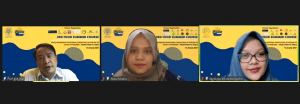 In addition, the second session was about “Supply Chain Management in Functional Food Industry” by Prof. Kune-muh Tsai. He opened the discussion with the definition of the supply chain. Other than that, Prof. Kune-muh Tsai gave an example where the functional food industry in Taiwan is mainly distributed across the midstream and the downstream. Next, Prof. Kune-muh Tsai also talked about the functional food supply chain, the differentiation between supply chains of functional food in Taiwan and Brazil, the example of the yogurt supply chain in China, supply chain of challenges of functional food due to trade war and pandemic, cold chain practice (best practice), and international supply chain also explained. Moreover, Prof. Kune-muh Tsai also explained how to control the supply chain risk.
In addition, the second session was about “Supply Chain Management in Functional Food Industry” by Prof. Kune-muh Tsai. He opened the discussion with the definition of the supply chain. Other than that, Prof. Kune-muh Tsai gave an example where the functional food industry in Taiwan is mainly distributed across the midstream and the downstream. Next, Prof. Kune-muh Tsai also talked about the functional food supply chain, the differentiation between supply chains of functional food in Taiwan and Brazil, the example of the yogurt supply chain in China, supply chain of challenges of functional food due to trade war and pandemic, cold chain practice (best practice), and international supply chain also explained. Moreover, Prof. Kune-muh Tsai also explained how to control the supply chain risk.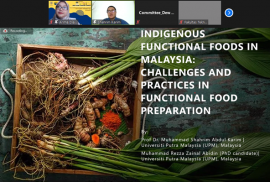
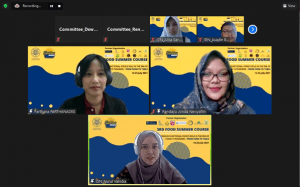 In the second session, the lecture was delivered by Assoc. Prof. Dr. Parthana Parthanadee about “Supply Chain and Logistics Analysis of Functional Foods Industry”. This session was led by Rendayu Jonda Neisyafitri, S.T.P., M.Sc. Prof. Parthana explained the drivers of supply chain and metrics in terms of responsiveness and efficiency, types of facilities, components of facilities, the role of facilities, inventory, transportation, data and analysis, price and the supply chain. The main process of supply chain includes planning, source and resources, create, deliver and returns. In addition, the supply chain operations structure consists of four major sections including performance, processes, practices, and people. By the end of his lecture, Prof. Parthana described the characteristics of agri-food supply chains that need to be taken into deliberate consideration when evaluating the resilience, including biological processes, perishability, structure, necessity, and system’s perspective.
In the second session, the lecture was delivered by Assoc. Prof. Dr. Parthana Parthanadee about “Supply Chain and Logistics Analysis of Functional Foods Industry”. This session was led by Rendayu Jonda Neisyafitri, S.T.P., M.Sc. Prof. Parthana explained the drivers of supply chain and metrics in terms of responsiveness and efficiency, types of facilities, components of facilities, the role of facilities, inventory, transportation, data and analysis, price and the supply chain. The main process of supply chain includes planning, source and resources, create, deliver and returns. In addition, the supply chain operations structure consists of four major sections including performance, processes, practices, and people. By the end of his lecture, Prof. Parthana described the characteristics of agri-food supply chains that need to be taken into deliberate consideration when evaluating the resilience, including biological processes, perishability, structure, necessity, and system’s perspective.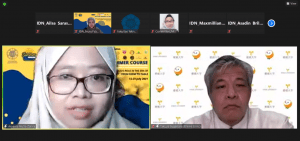 In the third session, the Prof. Takuya Sugahara shared the critical concept and idea about “Functional Foods In Japan: Regulation And Effects On Health”. This session was led by Aryanis Mutia Zahra, S.TP., M.Si. In the beginning of the lecture, Prof. Sugahara brought all the participants to the introduction of Ehime University at glance as he is affiliated at Ehime University. Subsequently, Prof. Sugahara divided his lecture into 3 sub-themes including Functional Food System in Japan, Evaluation of Food Functions, and Health Function of Spice. In Japan, food products were categorized into four groups, which comprise of food in general, foods with health claims, pharmaceutical products, and quasi-pharmaceutical products. In addition, Prof. Sugahara explained the various categories of food functions. In the other hand, Prof Sugahara emphasized that the critical concept of food with health claims is healthy foods that meet standards determined by the government and regulation. In terms of the regulation, functional food is divided into three main categories which include Food with Nutrient Function Claim (FNFC), Food for specified health use (FOSHU) and food with Function Claims (FFC). Food with Nutrient Function Claim (FNFC) is food that is characterized by the role vitamins and minerals added in the food. Food for Specified Health Use (FOSHU) is food that is scientifically recognized for its beneficial health impact, while Food with Function Claims (FFC) is a food which can be indicated with a function claim based on scientific evidence under the supplier’s responsibility.
In the third session, the Prof. Takuya Sugahara shared the critical concept and idea about “Functional Foods In Japan: Regulation And Effects On Health”. This session was led by Aryanis Mutia Zahra, S.TP., M.Si. In the beginning of the lecture, Prof. Sugahara brought all the participants to the introduction of Ehime University at glance as he is affiliated at Ehime University. Subsequently, Prof. Sugahara divided his lecture into 3 sub-themes including Functional Food System in Japan, Evaluation of Food Functions, and Health Function of Spice. In Japan, food products were categorized into four groups, which comprise of food in general, foods with health claims, pharmaceutical products, and quasi-pharmaceutical products. In addition, Prof. Sugahara explained the various categories of food functions. In the other hand, Prof Sugahara emphasized that the critical concept of food with health claims is healthy foods that meet standards determined by the government and regulation. In terms of the regulation, functional food is divided into three main categories which include Food with Nutrient Function Claim (FNFC), Food for specified health use (FOSHU) and food with Function Claims (FFC). Food with Nutrient Function Claim (FNFC) is food that is characterized by the role vitamins and minerals added in the food. Food for Specified Health Use (FOSHU) is food that is scientifically recognized for its beneficial health impact, while Food with Function Claims (FFC) is a food which can be indicated with a function claim based on scientific evidence under the supplier’s responsibility.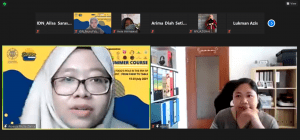 Moving on to the last session, the lecture was delivered by Dr. Realm Kohler geb. Alis about “Indigenous Functional Foods in the Philippines”. This session was led by Aryanis Mutia Zahra, S.TP., M.Si. Dr. Realm opened the lecture by sharing some data about the current health and nutrition in ASEAN. Then she explained about dietary diversification which defined the significance that diet must include sufficient quantity and variety of good quality of food that will cover most of the essential nutrients needed by the body. Southeast Asia (SEA) is considered as the food bowl of Asia which reflected by its huge biodiversity. In addition, Philippines is one of the 17 mega diversity countries in the world. Despite of its resource’s potency, Philippines has no specific regulations for functional foods. In general, some functional foods in Philippines are derived from its diversity of genetical natural resources, such as pigmented rice (brown rice), mangosteen, malunggay, turmeric, coffee, and fish.
Moving on to the last session, the lecture was delivered by Dr. Realm Kohler geb. Alis about “Indigenous Functional Foods in the Philippines”. This session was led by Aryanis Mutia Zahra, S.TP., M.Si. Dr. Realm opened the lecture by sharing some data about the current health and nutrition in ASEAN. Then she explained about dietary diversification which defined the significance that diet must include sufficient quantity and variety of good quality of food that will cover most of the essential nutrients needed by the body. Southeast Asia (SEA) is considered as the food bowl of Asia which reflected by its huge biodiversity. In addition, Philippines is one of the 17 mega diversity countries in the world. Despite of its resource’s potency, Philippines has no specific regulations for functional foods. In general, some functional foods in Philippines are derived from its diversity of genetical natural resources, such as pigmented rice (brown rice), mangosteen, malunggay, turmeric, coffee, and fish.